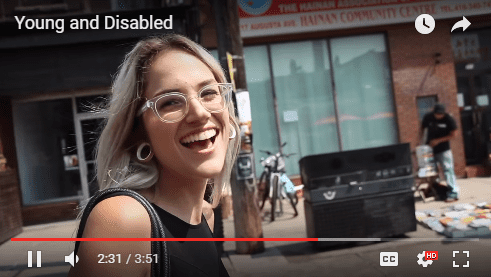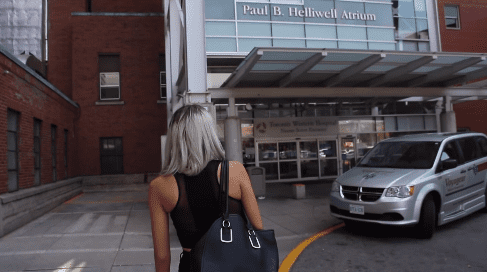Rachel Anne’s YouTube channel is an honest and compelling look into what it’s like to live with a chronic illness. Diagnosed with EDS (Ehlers–Danlos syndrome) – a genetic disorder that affects her ability to make collagen – Rachel is in near-constant pain. This in turn makes her easily tired, and she has to carefully spend her energy so as not to exacerbate her condition. Her EDS has affected every facet of her life; from friendships and school to dating and sex.
We asked her about why she decided to start documenting her journey on YouTube and what she has learned since.
RA: When I first started YouTubing, I guess I felt pretty alone. I felt (and still largely feel) pretty disconnected from my able-bodied peers and I wanted to have a space where I could articulate and share some of my experiences in the world as a young disabled person.
I want to continue to challenge ableism and encourage other people to do the same. My initial purpose hasn’t shifted but I’ve slowed down a bit with how much content I create discussing disability and ableism – it can be draining to discuss and at the end of the day I just want to be as happy and as healthy as I can be.

What is the most frustrating aspect of having EDS?
Probably our medical system and lack of care for EDS patients. Maybe you’ve had the experience where there’s something going on with your health and you need a referral from your family doctor to see a specialist – the wait is lengthy (longer waits can be over a year), it annoys you but you feel like you can tough it out. EDS is a comorbid condition, so there are several things going on with our bodies and some of these health issues can cause debilitating symptoms – it’s a lot of waitlists.
A couple of years ago I was told I had to wait seven months to see an Occupational Therapist who could prescribe me a wheelchair. Those seven months were devastating as a young person because it felt like my life was put on hold and no one cared that I was in desperate need. I cried and begged the doctor, asking if there was any other doctor I could see sooner and she just smiled at me while saying that this is a typical experience that most people with EDS have to go through. It still feels like that when new issues arise with my health: the lowered quality of life paired with the lack of urgency in care is demoralizing. I wouldn’t wish it on anyone.
I learned that I really needed to connect with the disabled and chronically ill community. I gain new perspectives and strength through engaging with the disabled community online and I’m so happy my videos have brought these meaningful relationships into my life.

What is the biggest misconception about having a disability?
That being disabled means that you are either severely disabled or not at all. I make use of different mobility aids – sometimes it’s a wheelchair, but sometimes it’s a cane, people are always shocked when they discover that I can also stand and walk on some days.
It probably comes from lack of exposure to different disabilities. People like me really aren’t depicted in films because it doesn’t make for a good (ableist) story: I’m not on my way to being cured and able bodied, and I’m not on my death bed…I’m just trying to live my life.
Before your diagnosis, what did you think was going on with your body?
Before my diagnosis I was gaslit by several doctors who either said I was over exaggerating my pain or just “extra sensitive.” My family doctor dismissed most of my symptoms as “typical for a teenage girl” experiencing puberty and suggested that I see a psychologist for treatment.
After over ten years of being told I was fine and just had a sensitive immune system, I believed it, but I also felt I was dying. It was hard, but I knew what I was experiencing wasn’t “normal.”
People should pay more attention to how they treat people around them. I think it’s important to be a kind, respectful, compassionate person – except towards bigots (you don’t owe them anything).
I finished my classes last month but doctor’s appointments have been keeping me busy since then. Honestly, it’s like a full time job just keeping track and scheduling all of them. I was accepted into the Master’s program at Ryerson for Documentary Media so hopefully I will be well enough to continue with that in September!




 Follow Us On Instagram
Follow Us On Instagram
